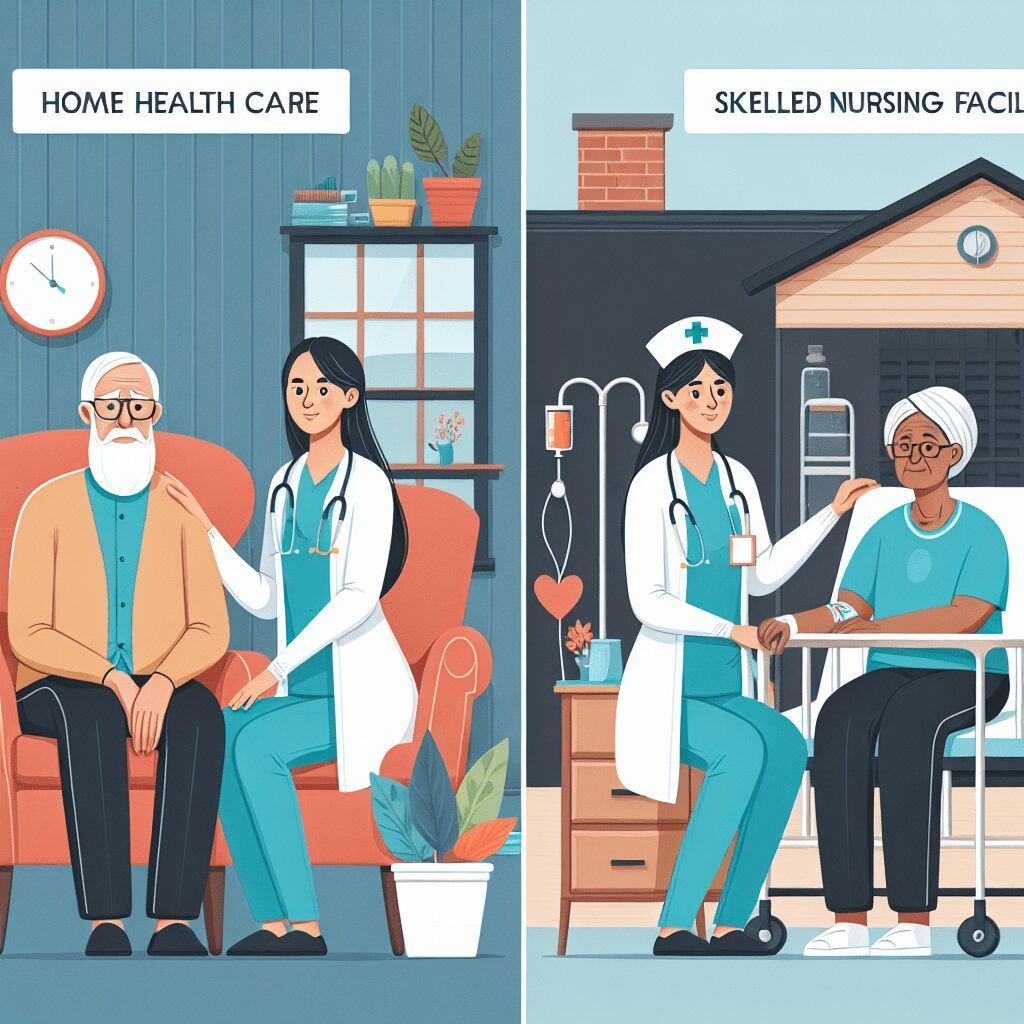Accredited Home Care Providers in Texas Houston
Are you looking for trusted caregivers in Houston, Texas to help your loved ones at home? Accredited home care providers in Houston offer quality services to ensure your family’s well-being and safety.
Choosing accredited care providers can improve your loved ones’ quality of life. In this article, we will explore the benefits of selecting these providers and how they can help your family members. Let’s dive in and learn more about the importance of choosing accredited caregivers for your loved ones.
Becoming a Licensed Home Care Provider in Texas
Types of Applications
There are four types of applications needed to become a licensed home care provider in Texas. These include:
-
Initial applications
-
Change of ownership applications
-
Renewal applications
-
Changes of information applications
Each type of application has a specific role in the licensing process for agencies offering home health, hospice, or personal assistance services.
-
Initial applications are for new agencies seeking licensure.
-
Change of ownership applications are required when ownership changes.
-
Renewal applications maintain a current license.
-
Changes of information applications update agency details with the state.
These application types ensure that agencies providing medical, nursing, and social services in Texas follow state regulations. Getting licensed is crucial for offering quality care and getting Medicare certification in the state.
Licensing Fees
Becoming a licensed home care provider in Texas involves navigating through different licensing fees. These fees are based on the type of services provided, such as home health services, hospice, or personal assistance.
The fees cover areas like initial applications, changes in ownership, renewals, expiration dates, and late fees. Understanding these fees is important for following state regulations in the Texas Administrative Code.
State standards also determine fees for surveys, initial certifications, and Medicare certifications. Agencies can make the application process smoother by learning about the Tulip system and necessary documents.
Knowing these fees helps in establishing a trustworthy home care provider agency in Texas that caters to residents’ medical, nursing, and social needs.
Category of Services
Licensed and Certified Home Health
Becoming a licensed and certified home health provider in Texas has specific regulations set by the state. Here’s how it works:
-
Home and Community Support Services Agencies (HCSSAs) need to complete an application.
-
This involves submitting required documents, paying a fee, and attending an orientation.
-
There are different applications for ownership changes, renewals, and updates.
-
Agencies offering home dialysis services have additional requirements, like a home dialysis designation.
-
Once licensed, agencies must meet standards like health and certification surveys.
-
To join the Medicare program, agencies must follow federal laws, including Medicare certification.
-
Pay attention to the expiration date, late fees, and renewal documents for compliance.
-
The HHS regional office oversees the licensing unit, providing support for quality home health services.
Licensed Home Health
To become a licensed home health provider in Texas, agencies must follow strict regulations in the Texas Administrative Code. The process involves:
-
Completing an initial application
-
Paying the required fee
-
Submitting necessary documents
-
Meeting licensing standards
Agencies providing specialized services like home dialysis must indicate this in their application. They also need to undergo additional health surveys to comply with state rules.
Once licensed, agencies can offer various medical and social services at individuals’ homes, including home health, hospice, and personal care.
Being certified under the Medicare program is crucial for reimbursement. Agencies must also adhere to federal laws to keep their license. Health and Human Services (HHS) regional office conducts regular surveys to ensure quality care.
Agencies can receive updates through email via GovDelivery to stay informed.
Licensed and Certified Home Health with Home Dialysis Designation
Licensed and Certified Home Health agencies in Texas with Home Dialysis Designation have specific regulations to follow for licensing.
The process for obtaining a license is different for agencies with this designation.
Additional standards must be met to ensure safe and effective dialysis care at home.
Staff members need extra training and certifications for dialysis procedures.
The Texas Administrative Code sets the licensing standards for these agencies, ensuring compliance with federal laws for top-quality care.
Key elements for maintaining certification include initial applications, change of ownership, renewal applications, and licensure expiration dates.
Agencies must pass initial certification surveys and health surveys.
Knowing the requirements, submitting necessary documents correctly, and paying fees is essential for running a successful Home Health agency with Home Dialysis Designation in Texas.
Licensed Home Health with Home Dialysis Designation
To become a Licensed Home Health provider with Home Dialysis in Texas, agencies need to meet specific criteria set by state regulations. This involves meeting licensing standards, submitting necessary documents, undergoing certification surveys, and following Federal laws. Agencies must also have Medicare certification and adhere to Texas Administrative Code for home health services.
A Home Dialysis Designation allows Licensed Home Health agencies to offer specialized care for patients needing dialysis at home. This designation helps in addressing the medical, nursing, and social needs of dialysis patients within their homes. It also ensures compliance with Medicare certification and state regulations for home health services.
Acquiring this designation enables agencies to broaden their services to include home dialysis, delivering comprehensive and individualized care to patients.
Hospice
Hospice programs provide specialized medical, nursing, and social support services to individuals facing terminal illnesses in the comfort of their own home.
In Texas, these programs are regulated by the Home and Community Support Services Agencies and must adhere to Texas Administrative Code regulations for licensure.
To qualify for Hospice care, individuals must have a prognosis of six months or less to live and choose comfort-focused care over curative treatments.
Choosing a Hospice program offers numerous benefits, including personalized care plans tailored to the patient’s medical and emotional needs, 24/7 support from trained caregivers and nurses, and Medicare certification for coverage of services.
By selecting a licensed agency in Texas, patients and their families can receive compassionate end-of-life support that prioritizes their dignity and quality of life during a difficult time.
Personal Assistance Services
The provider offers different personal assistance services to meet medical, nursing, and social needs at people’s homes. Services include home health, hospice, and personal care programs.
To comply with Texas regulations, the provider follows the Texas Administrative Code for Home and Community Support Services Agencies. They submit documents, pay fees, and meet state licensing standards.
The provider also goes through surveys for initial certification and health to get Medicare certification. This ensures their services meet the licensing and certification requirements in Texas.
Time Frames for Applications
When applying to become a licensed home care provider in Texas, applicants should consider the processing time. This time can vary depending on the type of application:
-
Initial application
-
Change of ownership
-
Renewal application
-
Changes of information
Each application type has its own set time frames. Meeting state regulations and requirements is important for timely processing. Specific deadlines for submission are outlined in the Texas Administrative Code. Failing to meet these deadlines may lead to late fees or denial of the application.
Applicants should submit all required documents promptly to prevent processing delays. Following the guidelines from the Texas HCSSA program orientation and licensing standards is necessary to obtain the required license for operating as a home care provider.
Changes of Information
Home Care Providers in Texas Houston need to report information changes promptly to the licensing authority. This includes adjustments to agency ownership, health services offered, or personnel changes.
Changes in ownership or management can impact the agency’s compliance with Texas Administrative Code regulations and the quality of care provided to patients.
In case of any changes, the agency must submit required documents and fees promptly to maintain licensure and eligibility for Medicare certification.
Timely reporting ensures compliance with state regulations and avoids penalties like late fees or license expiration.
Transparency with the licensing authority about agency changes is crucial to uphold care standards in the home support services program.
Forms
Parent, Branch, Alternate Delivery Site and Medicare Branch Applications
When applying for accreditation in Texas Houston as a home care provider, there are specific requirements to follow depending on the type of application you are submitting. Each application type has its own information and documentation needs.
Here is a breakdown of what each type of application may require:
-
Parent Application :
-
Ownership details
-
Agency structure information
-
Policies overview
-
Branch Application :
-
Documentation linking to parent agency
-
Operational procedures explanation
-
Alternate Delivery Site Application :
-
Location details
-
Services offered specifics
-
Compliance with state regulations
-
Medicare Branch Application :
-
Adherence to Medicare program standards
-
Service details
-
Staff qualifications
-
Compliance with federal laws
It’s important to understand and meet these specific requirements for each application type when navigating the accreditation process for home care providers in Texas Houston.
Statutes and Rules
Texas has specific statutes and rules for licensing home care providers. These ensure that providers follow state regulations. To maintain their licensure, home care agencies must:
-
Adhere to the Texas Administrative Code
-
Implement licensing standards
-
Undergo surveys
This process involves submitting necessary documents, paying fees, and following guidelines for initial application, ownership changes, and renewal. Non-compliance may lead to late fees or expiration of licensure.
Providers also need to meet federal laws like Medicare certification to offer home health, hospice, and support services effectively. By following the Tulip system and HHS regional office guidelines, agencies ensure they meet licensing standards.
To address clients’ social needs, agencies provide personal care, nursing, and medical services at their residences. Compliance with regulations helps home care providers deliver the best possible care for their clients in Texas.
Medicare Certification
The Texas Administrative Code explains how to get Medicare certification as a home care provider agency in Texas.
Home Health Services and Hospice agencies need to pass an initial certification survey. They also have to follow licensing standards to comply with state rules. Agencies must submit documents, pay a fee, and follow state rules.
After certification, agencies must maintain their licensure and renew it on time to avoid late fees. Medicare certification allows agencies to offer medical, nursing, and personal care at a resident’s home.
Certified agencies can provide services like Home Dialysis Designation and Alternate Delivery Site. This broadens their support services for the community. The HHS Regional Office supervises the certification process, ensuring compliance with federal laws to improve care quality.
HHSC Contracting
HHSC Contracting in Texas has specific requirements for licensed home care providers. To apply, you need to submit documents, complete an orientation, pay a fee, and follow Texas Administrative Code regulations.
Different services like Home Health, Hospice, and Personal Assistance have unique rules. Providers must comply with federal laws, pass surveys like the Initial Certification Survey, and maintain Medicare certification.
Licensing standards are overseen by the HHS Regional Office which includes rules for alternate sites and health surveys. Providers must offer comprehensive care focusing on medical, nursing, and social needs to improve individuals’ quality of life at home.
FAQ
What is the importance of accreditation for home care providers in Texas Houston?
Accreditation for home care providers in Texas Houston ensures high-quality care, safety, and credibility. It demonstrates compliance with industry standards and attracts more clients. For example, being accredited by the Home Care Association of America can enhance reputation and increase client trust.
How can I verify if a home care provider in Texas Houston is accredited?
To verify if a home care provider in Texas Houston is accredited, you can check with accrediting bodies like The Joint Commission or the Accreditation Commission for Health Care (ACHC). You can also ask the provider directly for proof of accreditation.
What criteria do home care providers in Texas Houston need to meet in order to become accredited?
Home care providers in Texas Houston need to meet criteria set by accrediting bodies such as The Joint Commission or Community Health Accreditation Partners (CHAP). This includes standards for patient care, staffing qualifications, safety practices, and record-keeping.
Are there different levels of accreditation for home care providers in Texas Houston?
Yes, there are different levels of accreditation for home care providers in Texas Houston. For example, some providers may be licensed by the Texas Department of Aging and Disability Services, while others may be certified by Medicare or accredited by organizations like The Joint Commission.
How can I find a list of accredited home care providers in Texas Houston?
You can find a list of accredited home care providers in Texas Houston by visiting the Texas Association for Home Care & Hospice website or contacting the Texas Department of Aging and Disability Services for a referral.
The post Accredited Home Care Providers in Texas Houston first appeared on Home Health & Care Giving Service in Houston, TX.












